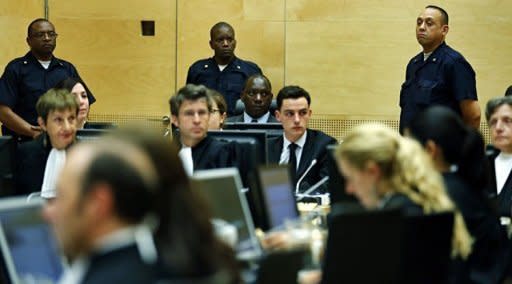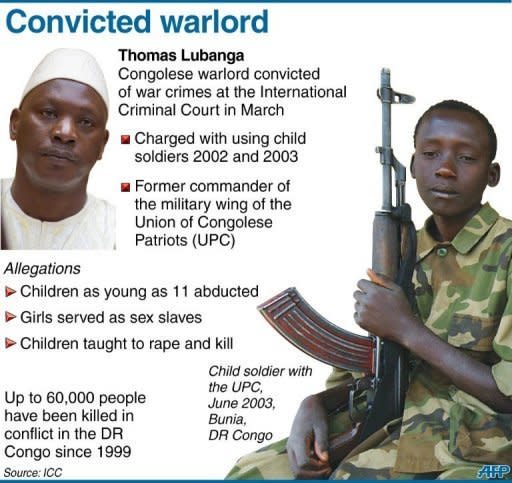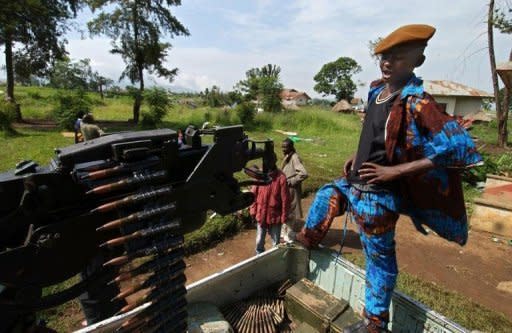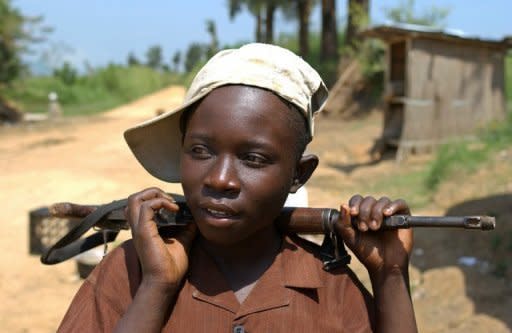War crimes court hands DR Congo rebel 14 years' jail
The International Criminal Court jailed Congolese warlord Thomas Lubanga for 14 years Tuesday for using child soldiers in his rebel army, the first sentence to be handed down by the world's only permanent war crimes tribunal. Rights groups welcomed the sentence as sending a strong signal against the use of child soldiers but regretted that the tribunal, based in The Hague, did not broaden the charges against Lubanga to include sexual crimes. "Taking into account all the factors... the court sentences Mr Lubanga to 14 years in prison," presiding Judge Adrian Fulford said at the tribunal. Lubanga, 51, was convicted in March of war crimes, specifically for using child soldiers in his rebel army in the Democratic Republic of Congo in 2002-03, in the ICC's first verdict since it started work a decade ago. The former militia commander was sentenced Tuesday by a three-judge bench for his part in a war in the gold-rich northeastern Ituri region which rights groups say killed some 60,000 civilians between 1999 and 2006. He had been found guilty of abducting children as young as 11 from homes, schools or football fields and forcing them to fight and commit atrocities. Fulford said the court has taken into account the time Lubanga has already spent behind bars since March 2006, meaning he will effectively spend eight years in prison. Lubanga had pleaded not guilty to the charges against him. "The crimes of conscripting and enlisting children under 15 and using them hostilities are undoubtedly very serious crimes," the judge said. But Fulford criticised the prosecution's handling of the case and singled out former chief prosecutor Luis Moreno-Ocampo, saying "Mr Lubanga was put under considerable unwarranted pressure by the conduct of the prosecution." Lubanga's trial started in early 2009, but stalled in mid-2010 after the prosecution refused to disclose the name of an intermediary to the defence, prompting the court to order Lubanga's release. That order was later reversed. Judge Fulford added the prosecution did not prove that Lubanga was involved in any sexual crimes committed against children. "Nothing suggests that Mr Lubanga ordered or encouraged sexual violence or that it could reflect his culpability," Fulford said. Armel Luhiriri, a liaison officer for the Coalition of the International Criminal Court, said the sentence "sends out a stark warning across the world to those engaged in the use of child soldiers that their criminal actions will land them in prison." Also accused of enlisting child soldiers in the same ICC case is Bosco Ntaganda, who was one of Lubanga's top aides at the time and now runs a group of mutineers called M23 and battling government troops in the east. Andre Kito, coordinator for the DR Congo's Coalition for the ICC, regretted that the court failed to cover the full scope of Lubanga's crimes. "Civil society organisations and victims still regret that the scope of charges was not broad enough since other crimes perpetrated such as sexual violence, summary executions and pillage were excluded," he said. Alpha Sesay, an officer at the Open Society's Justice Initiative said judges gave a fair appraisal for both the prosecution and Lubanga. "It also serves as a lesson to the prosecution after the first 10 years of the court's existence," Sesay said. Lubanga, who has been detained in The Hague since 2006, is the founder of the Union of Congolese Patriots (UPC), whose military wing is accused of killing hundreds of civilians. Lubanga's team has not yet indicated whether it would appeal his conviction or sentencing. Six countries have indicated their willingness to accept prisoners sentenced by the ICC: Austria, Belgium, Britain, Finland, Mali and Serbia. The ICC, the world's only independent permanent tribunal to try genocide, war crimes and crimes against humanity has issued four arrest warrants for crimes in the DR Congo since opening its doors in 2003. Two militia leaders, Germain Katanga, 34 and Mathieu Ngudjolo Chui, 41, who fought against Lubanga, are currently facing trial on similar charges. The ICC is investigating crimes in seven different countries, all of them African.





